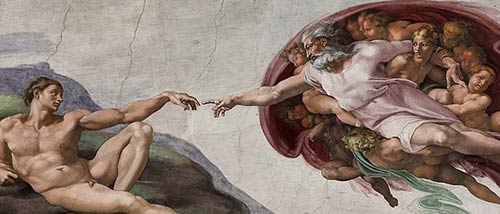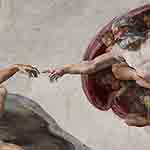
I often end up in conversations about evolution and Christianity.
One person, recently, typified an intelligent response. “Yes,” this person said, “with difficulty – it is possible to reconcile the Biblical creation account with evolution.” The starting assumption is – there is a conflict.
Those who are Christians and accept evolution either do not promote their position or mostly do so poorly. Switch on the TV, and free Christian TV channels endlessly promote an anti-evolution position. Search online, and slick websites of anti-evolution Christianity come to the fore.
In a recent conversation about all this with a Christian who accepts evolution, I asked her to name any bishop who had publicly declared their acceptance of evolution. She couldn’t. But she misunderstood my point, and asked if I thought the bishops generally didn’t accept evolution. I responded that I would suspect that every NZ Anglican bishop (and every NZ RC bishop for that matter) accepts evolution. But, good luck finding any public statement by any NZ Anglican bishop to that effect. Like the world being round (or landing on the Moon), I think they take for granted that this is the case and do so in such a way that they simply don’t think of asserting it. I take the bishops as examples of high-profile national Christian leaders who are generally understood as articulating Christian understanding in public. Meanwhile, the popular perception (including from many churchgoers) is that faith and evolution conflict.
I recently had a conversation (debate? argument?) with a Science teacher from a Christian school. This person asserted the “literal” (ie. this is history and science) understanding of Genesis, attributed the “apparent” contradictions within the texts to our limited human understanding, spoke to God who had replied and verified his position, and suggested that there very well may be a “Dome” up there as I hadn’t been up there myself to check that there wasn’t.
Bible Science History Faith
The focus of Bible-science-history-faith discussions is often on the first two or three chapters of Genesis (the other discussion is generally the Gospel miracle stories and the Resurrection). There is often little attempt to press these principals beyond those chapters. That works in both directions. It ends up with a Bible that can get the feeling of “The Bible is history except for the Creation accounts” rather than an intelligent approach to the Bible within which a not-conflicting-with-science-and-history reading of Genesis 1-3 appears perfectly natural.
What I think we also need to see more of is not simply a dialogue between science and faith within the beginning-of-the-universe-and-life framework, but also in the framework of redemption. In Romans 5, as just one example, St Paul writes:
Therefore, just as sin came into the world through one man, and death came through sin, and so death spread to all because all have sinned…For if the many died through the one man’s trespass, much more surely have the grace of God and the free gift in the grace of the one man, Jesus Christ, abounded for the many.
If Adam, and Adam’s sin is not historical, how does this affect our understanding of Christ’s redemption? If death is not the result of sin, but simply a part of nature present billions of years before humans (in fact a required driver of evolution), how does that affect our theology?
These early chapters of Genesis form the foundations, and often the unexamined presuppositions, of so much of our culture and civilisation. All these are opened up to re-examination: attitudes to gender, work, death, the environment and nature, sexuality, marriage, and so on and so forth…
If you appreciated this post, do remember to like the liturgy facebook page, use the RSS feed, and sign up for a not-very-often email, …




Reblogged it. This is my experience in UK. Most don’t want to upset and annoy creationists. But a serious issue in UK There was at least one creationist bishop recently https://michaelroberts4004.wordpress.com/2015/02/23/evolution-and-religion-in-britain-from-1859-to-2013/
Thanks, Michael. Your link gives a wonderful historical frame to this discussion. Easter Season Blessings.
Thanks Bosco for this. I’d like to add my perspective, and would be interested in your response if you have time. I taught recently a 3-week class in sunday school (United Methodist) on the topic of creation – evolution. See below to access this. At the end of session two a devout member of the class walked out when i showed the earth could not be younger than 50,000 years (based on good science data). She said I must not believe Genesis because i didn’t hold to a date of creation of 6,000 years. I realized later that she didn’t believe the science, and this is the case for a lot of devout Christians. Now, I’m a Ph D physicist, and I can understand why a layman has trouble understanding evolution, because it is complicated, and often not explained well. But the science data behind an earth that has to be older than 50,000 years is much simpler and extremely hard to explain away (I am still waiting….). As an evangelist once said, “If God made science, how can it be wrong?” My lessons can be found under IanDexterPalmer, and here is the link http://www.iandexterpalmer.com/creation-and-evolution-part-1-role-of-consciousness/
Thanks so much for your comment and link, Ian.
I struggle to see where the conflict lies between science and faith/religion (yes: first degree science, second degree theology). Science can tell someone the chemical composition of a photograph, the process of its production, the thickness and weight of it, the size of it… but science cannot tell you that this is a photo of someone I love, the event that makes the photo significant, the importance of the relationship…
Those who hold to a 6,000-year-old universe can argue that God made the universe 6,000 years ago looking old. When God made the tree (bing! tree!) it was only a minute old – but God made it with rings giving the impression that it is over a hundred years old. When God made the stone (bing! stone!) God made it looking like it had undergone geological processes. There were no dinosaurs – God simply made dinosaur bones (bing!)
I think being honest with the creation stories in the Bible leads me to treat them not as science and history. This is why I write, in my post, to not obsess about Genesis 1-3 but to have an approach to reading the whole Bible in which (with which) one reads those chapters.
As a blogger, Ian, might I advise you, when you have a series like that, to have a link at the end of Part 1 that leads to Part 2 (etc). I could find the series – but it took a bit; and I can see that it will become nigh impossible as they drop off your home page.
Easter Season Blessings.
I have scratched this itch for a long time now.
For me, a God that creates the world by fiat, is, yes, impressive. But it is a static, constrained and limited creation.
A God who creates a universe, itself an agent of creation which then creates myriad further creative engines, of which evolution is but one, albeit astonishing, example, is a far more magnificent, (literally) awesome God.
And we may read Genesis with honest and humble intent to learn about our God and his creation, while remembering that the object of our worship is not the book, but He to whom the book attests.
The map is not the territory.
Amen, Alastair! Thanks. Easter Season Blessings.
Why not start with the Big Bang?
I still remember those classes in the seminary, when the Word’s begottenness «before all ages» was highly debated. At one moment, I read saint Augustine about his conception of the time (which, btw, was not taught in our patrology), and some paper about time relativity. I suddenly realised that at the seminary, as in popular culture, we were assuming time to be not a creature, but a condition for God too.
Therefore, something like the Big Bang has much more theological implications than… evolution of one kind or the other.
You are touching on different questions (related, but sharply different), which you put in the same bag. Here they are:
– Is evolution compatible with the Christian faith? (IMO, yes)
– Is the evolution within one biological family a proven fact? (IMO, yes)
– Is the evolution of life from anorganic material a fact? (IMO, not at all)
– What are the probabilities of spontaneous apparition of life on Earth? Is faith in such next-to-zero probabilities a faith in God, or is it a new religion?
– Has humankind evolved from non-human animals?
~~ If yes:
— We have to totally revise our view of “imago Dei”, which is based on non-evolution assumptions.
— We have to see what the ancenstral sin was.
— We have to articulate that with Christology and soteriology.
— We have to review Christian speciism.
So, you see, the task is big. CS Lewis was one who tried to undertake it. But maybe the bishops are not as wise as CS Lewis. In Belgium, the RC bishops believe in evolutions of all the types. But I once tried to discuss theology in light of human evolution, with one of them, and I was given the most funny fairy tales of my life (about “imago Dei”).
Thanks, George. I wouldn’t use “belief” of evolution. The “Big Bang”, of course, was a theory of Belgian priest, Georges Lemaître. And the term, “Big Bang” was a put down by atheist scientists because something-from-nothing appeared to them a religious piece of nonsense. As for time: of course it is a creature – there was nothing “before” the Big Bang, because time is one of the dimensions that came into existence at that point (well a seems-to-be half dimension). Easter Season Blessings.